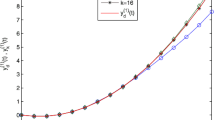Abstract
This paper deals with the problem of iterative learning control for a class of discrete singular systems with fixed initial shift. According to the characteristics of the discrete singular systems, a closed-loop learning algorithm is proposed and the corresponding state limiting trajectory is presented. It is shown that the algorithm can guarantee that the system state converges uniformly to the state limiting trajectory on the whole time interval. Then the initial rectifying strategy is introduced to the discrete singular systems for eliminating the effect of the fixed initial shift. Under the action of the initial rectifying strategy, the system state can converge to the desired state trajectory within the pre-specified finite time interval no matter what value the fixed initial shift takes. Finally, a numerical example is given to illustrate the effectiveness of the proposed approach.
Similar content being viewed by others
References
Bien Z and Xu J X, Iterative Learning Control: Analysis, Design, Integration and Applications, Kluwer Academic Publishers, Dordrecht, 1998.
Xu J X and Tan Y, Linear and Nonlinear Iterative Learning Control, Springer-Verlag, Berlin, 2003.
Arimoto S, Kawamura S, and Miyazaki F, Bettering operation of robots by learning, Journal of Robotic Systems, 1984, 1(2): 123–140.
Ahn H S, Chen Y Q, and Moore K L, Iterative learning control: Brief survey and categorization, IEEE Transactions on Systems Man and Cybernetics-Part C: Applications and Reviews, 2007, 37(6): 1099–1121.
Bu X H, Yu F S, Hou Z S, et al., Iterative learning control for a class of nonlinear systems with random packet losses, Nonlinear Analysis: Real World Applications, 2013, 14(1): 567–580.
Hou Z S, Chi R H, and Gao H J, An overview of dynamic-linearization-based data-driven control and applications, IEEE Transactions on Industrial Electronics, 2017, 64(5): 4076–4090.
Chi R H, Hou Z S, Jin S T, et al., An improved data-driven point-to-point ILC using additional on-line control inputs with experimental verification, IEEE Transactions on Systems Man and Cybernetics: Systems, 2017, DOI: 10.1109/TSMC.2017.2693397.
Sun M, Ge S S, and Mareels I M Y, Adaptive repetitive learning control of robotic manipulators without the requirement for initial repositioning, IEEE Transactions on Robotics, 2006, 22(3): 563–568.
Chen Y Q, Moore K L, Yu J, et al., Iterative learning control and repetitive control in hard disk drive industry–A tutorial, International Journal of Adaptive Control and Signal Processing, 2008, 22(4): 325–343.
Sun H Q, Hou Z S, and Li D, Coordinated iterative learning control schemes for train trajectory tracking with overspeed protection, IEEE Transactions on Automation Science and Engineering, 2013, 10(2): 323–333.
Porter B and Mohamed S S, Iterative learning control of partially irregular multivariable palnts with initial impulsive action, International Journal of Systems Science, 1991, 22(3): 447–454.
Lee H S and Bien Z, Study on robustness of iterative learning control with non-zero initial error, International Journal of Control, 1996, 64(3): 345–359.
Park K H, Bien Z, and Hwang D H, A study on the robustness of a PID-type iterative learning controller against initial state error, International Journal of Systems Science, 1999, 30(1): 49–59.
Sun M X and Wang D W, Iterative learning control with initial rectifying action, Automatica, 2002, 38(7): 1177–1182.
Sun M X and Wang D W, Initial shift issues on discrete-time iterative learning control with system relative degree, IEEE Transactions on Automatic Control, 2003, 48(1): 144–148.
Sun M X, Bi H B, Zhou G L, et al., Feedback-aided PD-type iterative learning control: Initial condition problem and rectifying strategies, Acta Automatica Sinica, 2015, 41(1): 157–164 (in Chinese).
Meng D Y, Jia Y M, and Du J P, Robust ILC with iteration-varying initial state shifts: A 2D approach, International Journal of Systems Science, 2015, 46(1): 1–17.
Wei Y S and Li X D, Robust higher-order ILC for non-linear discrete-time systems with varying trail lengths and random initial state shifts, IET Control Theory and Applications, 2017, 11(15): 2440–2447.
Dai L Y, Singular Control Systems, Springer-Verlag, New York, 1989.
Duan G R, Analysis and Design of Descriptor Linear Systems, Springer-Verlag, New York, 2010.
Xu S Y and Lam J, Robust Control and Filtering of Singular Systems, Springer-Verlag, New York, 2006.
Wu L G, Shi P, and Gao H J, State estimation and sliding mode control of Markovian jump singular systems, IEEE Transactions on Automatic Control, 2010, 55(5): 1213–1219.
Zheng G and Bejarano F J, Observer design for linear singular time-delay systems, Automatica, 2017, 80(6): 1–9.
Xu Q Y, Zhang Y J, He W L, et al., Event-triggered networked H∞ control of discrete-time nonlinear singular systems, Applied Mathematics and Computation, 2017, 298: 368–382.
Piao F X and Zhang Q L, Iterative learning control for linear singular systems, Control and Decision, 2007, 22(3): 349–356 (in Chinese).
Piao F X, Zhang Q L, and Wang Z F, Iterative learning control for a class of singular systems, Acta Automatica Sinica, 2007, 33(6): 658–659 (in Chinese).
Tian S P and Zhou X J, State tracking algorithm for a class of singular ILC systems, Journal of Systems Science and Mathematical Sciences, 2012, 32(6): 731–738 (in Chinese).
Gu P P, Fu Q, and Wu J R, State tracking algorithm for linear singular iterative learning control systems with fixed initial shift, Mathematica Applicata, 2017, 30(1): 8–15 (in Chinese).
Tian S P, Liu Q, Dai X S, et al., A PD-type iterative learning control algorithm for singular discrete systems, Advances in Difference Equations, 2016, 2016: 321.
Author information
Authors and Affiliations
Corresponding author
Additional information
This research was supported in part by the National Natural Science Foundation of China under Grant Nos. 61374104 and 61773170, and the Natural Science Foundation of Guangdong Province of China under Grant No. 2016A030313505.
This paper was recommended for publication by Editor JIA Yingmin.
Rights and permissions
About this article
Cite this article
Gu, P., Tian, S. & Liu, Q. Closed-Loop Iterative Learning Control for Discrete Singular Systems with Fixed Initial Shift. J Syst Sci Complex 32, 577–587 (2019). https://doi.org/10.1007/s11424-018-7221-x
Received:
Revised:
Published:
Issue Date:
DOI: https://doi.org/10.1007/s11424-018-7221-x




